The discussion board site 4chan has been a part of the Internet’s dark underbelly since its creation, in 2003, by ‘moot’ (Christopher Poole). But recent events have brought it under the spotlight, making it a central figure in the outlandish 2016 US election campaign, with its links to the “alt-right” movement and its rhetoric of hate and racism. However, although 4chan is increasingly “covered” by the mainstream media, we know little about how it actually operates and how instrumental it is in spreading hate on other social platforms. A new study, with colleagues at UCL, Telefonica, and University of Rome now sheds light on 4chan and in particular, on /pol/, the “politically incorrect” board.
What is 4chan anyway?
4chan is an imageboard site, built around a typical bulletin-board model. An “original poster” creates a new thread by making a post, with one single image attached, to a board with a particular focus of interest. Other users can reply, with or without images. Some of 4chan’s most important aspects are anonymity (there is no identity associated with posts) and ephemerality (inactive threads are routinely deleted).
4chan currently features 69 boards, split into 7 high level categories, e.g. Japanese Culture or Adult. In our study, we focused on the /pol/ board, whose declared intended purpose is “discussion of news, world events, political issues, and other related topics”. Arguably, there are two main characteristics of /pol/ threads. One is its racist connotation, with the not-so-unusual aggressive tone, offensive and derogatory language, and links to the “alt-right” movement—a segment of right-wing ideologies supporting Donald Trump and rejecting mainstream conservatism as well as immigration, multiculturalism, and political correctness. The other characteristic is the fact that it generates a substantial amount of original content and “online” culture, ranging from the “lolcats” memes to “pepe the frog.”
This figure below shows four examples of typical /pol/ threads:
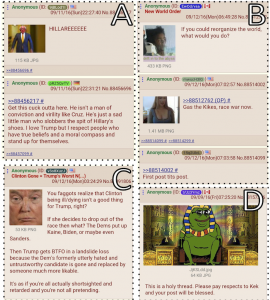
Raids towards other services
Another aspect of /pol/ is its reputation for coordinating and organizing so-called “raids” on other social media platforms. Raids are somewhat similar to Distributed Denial of Service (DDoS) attacks, except that rather than aiming to interrupt the service at a network level, they attempt to disrupt the community by actively harassing users and/or taking over the conversation.
In Summer 2016, an “Operation Google” was launched on /pol/ in response to companies like Google announcing the introduction of anti-trolling machine learning based technology. Basically, users would replace hate words with the name of large tech companies – e.g. using “googles” instead of “niggers” and “skypes” instead of “kikes” (a derogatory expression for Jewish people). Our study shows that Operation Google had a substantial impact on /pol/ and is still somewhat in effect. However, its effect beyond 4chan itself was actually quite limited and less prevalent than what was reported by the media.
We then explored raiding behavior on other social media platforms. This is particularly important since bullying and abuse online have been practically ignored for years, dismissing it with bleak and counter-productive “just disconnect” advice, despite cyberbullying “side-effects” often including depression, self-harm, and even suicide. In 2015, a survey by the cyberbullying research centre found that 43% of students had experienced cyberbullying at least once in their lifetime. So, while users that are targeted and abused on 4chan could “disconnect”, we certainly cannot ignore cases where 4chan’s hate-filled vitriol spreads onto third-party services like YouTube.
Our research takes a quantitative, statistical approach in trying to measure this phenomenon. Basically, we find statistically significant evidence that certain YouTube comments linked to by /pol/ experience a peak in activity. Using cross-correlation – a measure of similarity of two series as a function of the lag of one relative to the other – we can estimate the synchronization delay between videos linked from /pol/ and YouTube comments. We go one step further and find that, as the lag approaches zero, we observe a stark increase in the hate words that appear in the YouTube comments. In other words, we find statistically significant evidence that /pol/ is attacking YouTube comments.
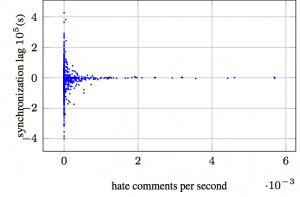
Additional findings from our research can be found in our technical report. Among other things, our analysis provides an explanation of how certain unique characteristics of 4chan (like anonymity and ephemerality) influence content and behavior of the board. For instance, the “bump limit” system ensures that certain threads do not monopolize the conversation, ensuring fresh content is constantly generated. We also give some insight into the number of unique users that participate in threads, finding that while /pol/ is anonymous, it is also full of many voices, and shed light on the “hate behavior” of different countries.
/pol/’s reaction to our study
We also report our first-hand experience of the way that /pol/ can seize upon a topic of interest. Our technical report was originally submitted to ArXiv on 11 October 2016. Within 24 hours, it had become a hot topic of discussion on /pol/, and remained so for the next several days. Looking at /pol/’s reaction to our work gives us a few more insights into their behavior as well as the workings of the community.
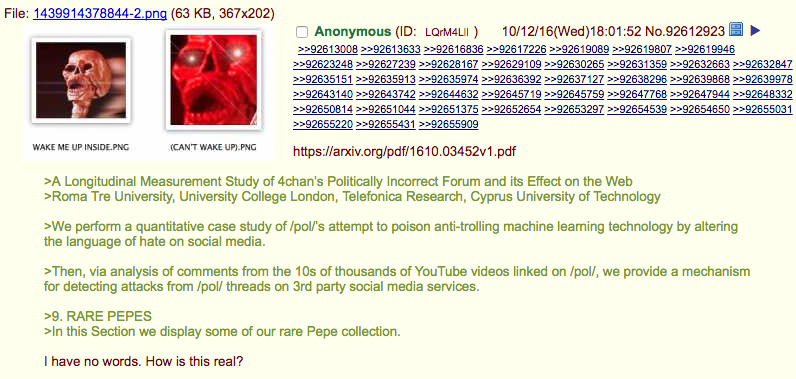
The initial reaction to the paper was incredulity. While /pol/ users tends to revel in their own media coverage, apparently they did not expect to be viewed under the lens of science. Quickly, however, /pol/ began diving into our results and seemed, in their own way, to be genuinely enjoying the work. For example, they latched on to our finding with respect to hate comments on YouTube.
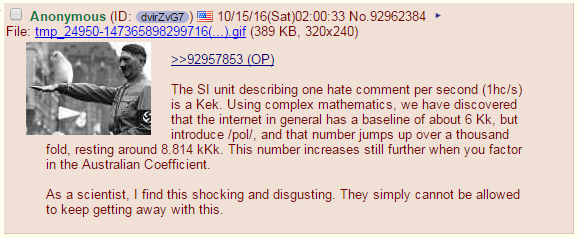
With 4chan’s history as an image board, it is quite common to share content via screenshots, and /pol/ users found many screenshot-worthy bits from our paper. While the entire paper itself was distributed as screenshots (one image/post per page), we also saw numerous instances of /pol/’s “meme creation process.” Collages of “takeaways” were built and screenshots were modified in a variety of ways.
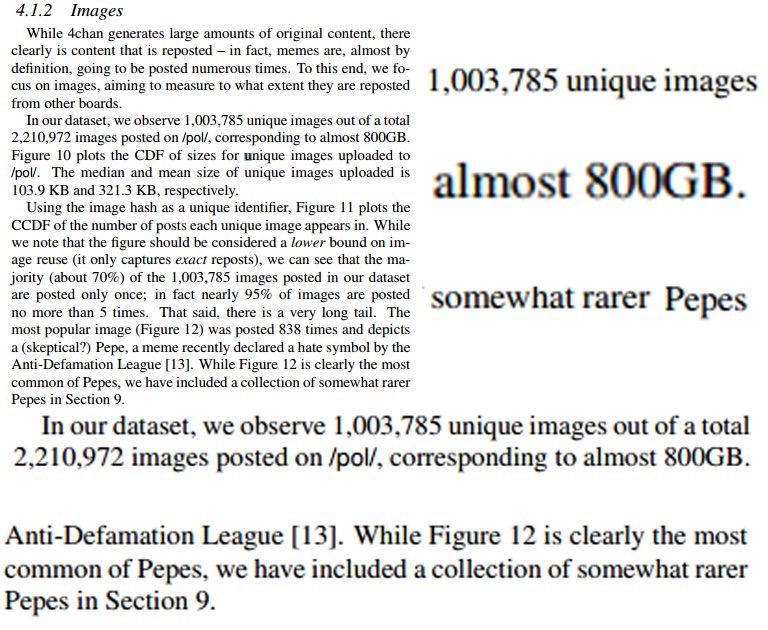
Although there were many parts of the paper that /pol/ seemed to find interesting, there was a certain Figure they were particularly fond of. Figure 12 from the original version of our technical report depicted the most re-posted (i.e. “popular”) image from our dataset, which happened to be a Pepe. Along with its caption, this empirical demonstration of the “least rare Pepe” (reproduced below) was the subject of much discussion and was even submitted to Know Your Meme.

Much to our surprise, some of the commenters on /pol/ had cogent (and even positive!) reviews of our work. These posters reveal a side of /pol/ that is often missed by most people. It is a diverse crowd, and at least some posters are willing to critically evaluate the information that is shared.
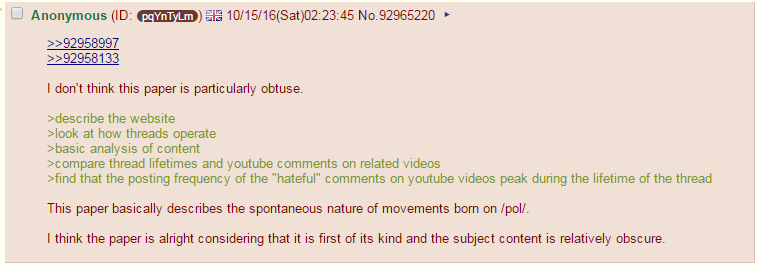
While on the whole /pol/’s reaction was mostly benign, bordering on amusing, we did also witness its dark side. For example, almost immediately /pol/ users began searching for personal information about us. This culminated in a thread where a /pol/ user analyzed our previous work and social media presence, providing racially charged commentary and a final judgement as to who was responsible for the work.
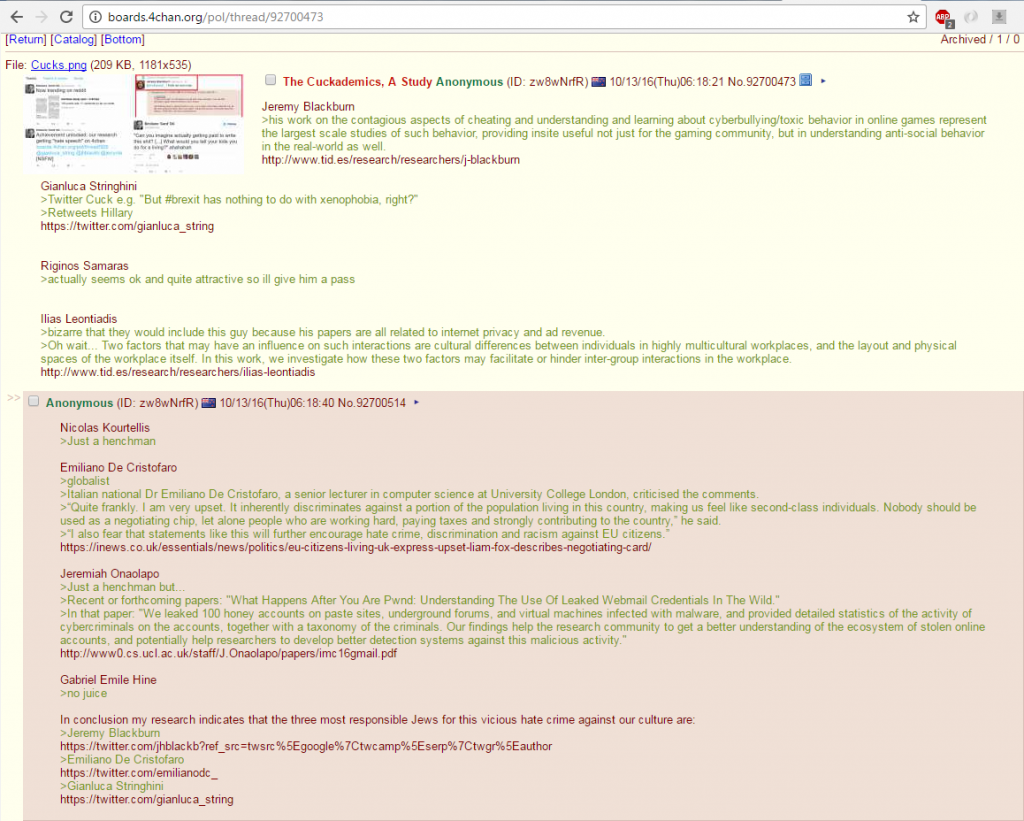
Finally, one open question from this work is how information diffuses within /pol/. While we have measured raiding behavior at large, we have yet to dive into how it is coordinated, and the higher level question of how /pol/ acquires, vets, and distributes information. We received a glimpse into this process as /pol/ users began analyzing our funding sources. Within about a day, /pol/ users declared that our work was a “UN funded” study. While this is completely untrue, this meme persisted for several days and was even picked up by various news aggregators and social media sites (e.g. Boing Boing), demonstrating first hand how effective /pol/ is at spreading (dis)information.

Looking ahead
Ultimately, 4chan and /pol/ are continuously evolving. Over the past year, the sale of 4chan to Hiroyuki Nishimura, recent rumors of the site struggling with monetization, the introduction of very mild moderation by so-called janitors, or other controversial events like the #GamerGate incident, naturally create shifts in topics and activities, as well as users moving to other, somewhat similar sites (e.g. 8chan). But as the world increasingly looks at 4chan, 4chan will not so silently be looking back — a fact that we can personally attest to.
An edited version of this article was originally published on The Conversation, written by Emiliano De Cristofaro, UCL.![]()

>not funded by UN
least_rare_pepe.jpg
ayy lmao
TLDR
#MAGA
Praise Kek
Those racist goys of 4chan should be shut down!
>We are totally not funded by globalists go..errr guys!
>oy gevalt!
ITS ANUDA SHOA!!!
Pls include me in the screencap 😀
When U.N. sends its Pepes, they’re not sending their best. They’re not sending Kek, they’re not sending rares. They’re sending Pepes that have lots of copies, and they’re bringing those copies with us. They’re bringing tumblr. They’re bringing facebook. They’re common. And some, I assume, are rare Pepes.
Please keep studying /pol/. This is very amusing to us.
OY VEY ITS ANODA SHOAA SHUT IT DOWNN
They can’t keep getting away with it!
Offensive or not, that IS the point of free speech. Because one side does not like what the other is saying does not permit free speech from being destroyed. I dislike much what is stated about many things, but WHY do I need someone else to protect me from this? I am not being forced. If there is something I do not like, I look away or turn it off. We are not children who cannot govern ourselves. You are going to learn if you keep pressing on people, on their freedoms, they do eventually do something to stop it. You don’t take away from others, you create tools so those who do not like something can keep THEMSELVES from it, not others.
I seriously do not appreciate the widespread hate that white people are getting either. This is coming from an Asian man. I am sick of turning my TV on or radio and listening to how evil white people are, or how white people need to start ignoring having children with each other. It’s DISGUSTING. It’s racist and I am sick of people trying to tell me to try to make grey children who have no culture or heritage to look forward to.
No matzah ball soup for you, goyim.
It was the kikes all along.
I’m latino non-white person and I agree.
This comment section in now the property of /pol/. If you want it back,
you will deposit 6,000,000 shekels into a bucket of popcorn chicken and drop it at the corner of MLK blvd and 88th st New York.
You’re so serious. Why?
– The Jokey
“very mild moderation by so-called janitors”
That’s a LIE.